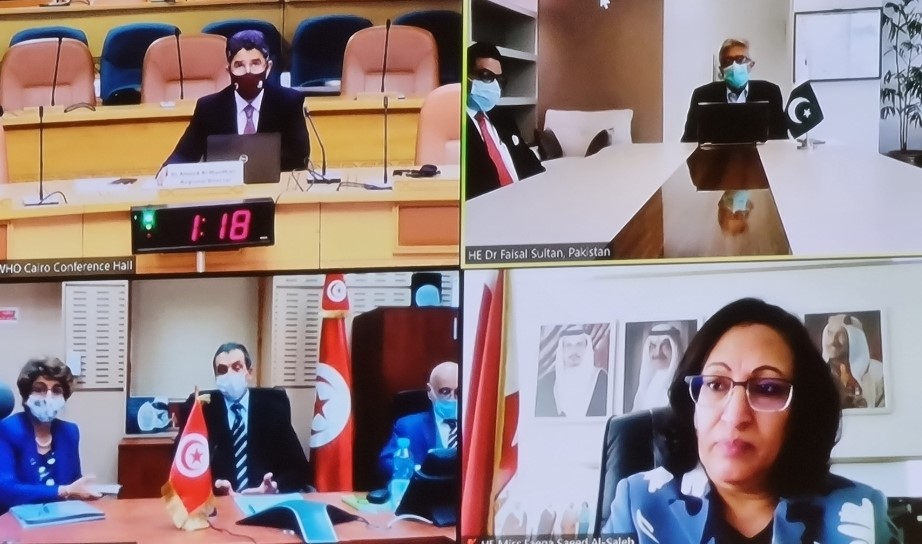
19 November 2020 – I would like to extend a warm welcome to our guests today: H.E. Ms Faeqa Bint Saeed Al-Saleh, Minister of Health of Bahrain, H.E. Dr Faisal Sultan, Special Assistant to Prime Minister for National Health Services Regulations and Coordination, Pakistan, and Dr Faycal Ben Salah, Director General of Health, on behalf of H.E. Dr Fawzi Mahdi, Minister of Public Health of Tunisia.
Dear colleagues and friends,
Thank you for joining us today for this first virtual press briefing with ministers of health from the Region. While we usually update you on the latest developments related to COVID-19 during our bi-weekly press briefings, it is also important for us to be aware of the significant efforts being made by countries to respond to COVID-19.
Before I hand over to the esteemed ministers, I would like to quickly update you on the current situation in the Eastern Mediterranean Region.
Out of 55 million cases globally, our Region reports more than 3.6 million cases of COVID-19. These are cases reported by ministries of health to WHO and are usually severely ill cases admitted into hospital. We believe the actual number of confirmed cases across the Region to be even higher, and the recent trends remain highly concerning – as they are in Europe and the Americas.
While more than 60% of all cases in the past week were reported from 3 countries – Islamic Republic of Iran, Jordan and Morocco – several other countries continue to see an increase in cases, including Lebanon and Pakistan. Countries that reported the largest increase in deaths included Jordan, Tunisia and Lebanon.
These trends indicate once again that we need a comprehensive approach to the management of the pandemic – continued scaling up of proven public health measures, consistent adherence to the personal protective measures that we know work, and select and targeted application of social measures, such as lockdowns. None of these measures, by themselves, will control the pandemic.
In fact, we are now observing the weaknesses of an over-reliance on some of the restrictive social measures that were put in place at the beginning of the pandemic, such as so-called “lockdowns.” The increases we are seeing now are clearly a result of the easing of lockdown and restrictions, which succeeded in controlling the pandemic in our Region in July and August.
But lockdowns can only limit transmission to a certain extent – once countries and societies re-open, the disease will spread if governments do not continue to effectively implement proven public health interventions, and people do not strictly adhere to personal protective measures.
At the regional level, a ministerial working group has been established to review lessons learnt from countries during the past 9 months, and present key recommendations to countries as they adapt and revise their strategies. This will also involve greater coordination by countries who share borders.
Recent news of one or more potential vaccines for COVID-19 has given us all a glimmer of hope, but a vaccine is not the magic solution to ending this pandemic. Until every last person is vaccinated, there is still a risk that people who carry the virus can pass it on to others.
Preventative measures that we know work well and work now, including mask use, are still not being fully practised in our Region. Physical distancing, which is one of the most effective ways to prevent transmission, is not strictly followed. In many countries, we are seeing a concerning deterioration in adherence to these and other public health measures.
While we trust communities to take action to protect themselves and others, countries may need to make tough decisions and apply stricter measures to ensure that their populations adhere to the proven measures that work.
Today, I would like to say to all people in the Eastern Mediterranean Region: this is not the time to relax. Lessons from Asia, where the numbers of COVID-19 are steadily declining, tell us that scaled up public health measures and engaged communities are the most effective ways for containing spread of the virus. This is something that we have repeatedly stressed.
While countries have an obligation to do more to identify every case and trace every contact, it is a fact that the more people who contribute to breaking the chain of transmission, the easier it becomes to identify cases and contain the virus before it becomes widespread.
Health systems in our Region, no matter how advanced, are struggling to keep up with increasing cases. Health workers on the front lines are struggling mentally and physically. And patients with other diseases that require medical care and treatment are also affected as hospitals and intensive care beds fill up.
In addition to the millions of people already mourning the loss of their loved ones, millions more face the same fate if we do not act now. We cannot – and should not – wait until a safe and effective vaccine becomes readily available for all, because we simply do not know when this will be.
In the first 9 months of the pandemic in our Region, more than 3 million were infected and 76 000 died. The lives of as many people – if not more – are at stake over the next 9 months. And in addition to preventing this tragic premonition from becoming a reality, we must also address the cracks that have been revealed in our health care systems, to prevent this from happening again.
I would now like to welcome the ministers of health and senior health officials from Bahrain, Pakistan and Tunisia to make their remarks and share their insights on the control of the pandemic.
Remarks
H.E. Ms Faeqa Bint Saeed Al-Saleh, Minister of Health of Bahrain








